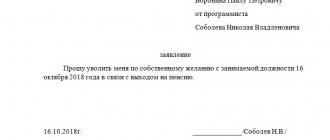An employment contract concluded between an employee and an employer is a bilateral document. This means that liability for violation of its provisions may arise for both the employee and the employer. Rostrud primarily guards the interests of the employee. However, the employer also has sufficient legal grounds to defend its interests if the employment contract is violated by the other party.
Question: A former employee of the organization, in violation of the confidentiality agreement concluded with her upon hiring after the termination of the employment contract, stole a client from the organization, offering him more favorable terms of cooperation. The client terminated the contract with the organization. Can a former employee be held liable? If yes, what ways are there for this? View answer
Violations of the contract by the employee
An employee who violates an employment contract, in certain cases, risks immediately losing his job. Let's look at them first.
Question: Is non-payment of a bonus a violation of labor laws if the employment contract states that wages consist of an official salary and a bonus? View answer
Can I be fired immediately?
In Art. 81 of the Labor Code of the Russian Federation, paragraph 6, contains a list of violations for which liability may occur immediately. The administration may terminate the employment relationship with an employee without waiting for him to violate the employment contract again:
- Disclosure of secrets related to the performance of work duties. Here we are talking not only about commercial and official secrets, but also about the disclosure of personal data to third parties. The fact of disclosure must be documented by explanatory notes, memos from other employees, video surveillance data and other legitimate information. In addition, an explanation from the violator himself or a corresponding act in case of refusal to provide it is necessary.
- Truancy. Absenteeism is considered to be a situation when an employee is absent from work for the entire working day, shift, or is absent for more than 4 hours in a row without good reason. Judges recognize as valid reasons a strike, arrest, force majeure circumstances beyond the control of the employee (for example, unsatisfactory performance of a transport company), termination of work after a long delay in wages (more than 15 days, after a written warning to the administration), issued sick leave and a number of others. Written evidence of the offense and a written explanation from the offender will also be required.
- Drunk at work. There is a peculiarity here - the courts certainly take into account only the medical report, from which it follows that the employee was drunk. If he refuses to undergo an examination, evidence may include employee testimony, a video indicating that the employee behaved inappropriately at work. In this case, we are talking not only about alcohol intoxication, but also about its other varieties, for example, drugs. A drunk person must be immediately removed from work.
- Property violations: theft, embezzlement, damage, intentional destruction of company property. Here, the employer delegates the authority to establish the truth to the competent authorities and does not independently collect evidence. This case is quite ambiguous from the point of view of judicial practice. Thus, dismissal may be considered illegal if there was an amnesty in the case, a confession (this circumstance is not in itself evidence of guilt), etc.
- Violation of labor safety standards with grave consequences or the threat thereof.
Note! If an employee violated the rules for working with classified information, but it did not become available to third parties, his dismissal will be illegal. At the same time, the use of other, less severe disciplinary sanctions is acceptable.
Question: Is it possible to recognize labor costs for income tax purposes if the written form of the employment contract is not complied with (Clause 1, Article 252, Article 255 of the Tax Code of the Russian Federation)? View answer
What is the responsibility of the employee and employer for violation of the terms of the employment contract ?
It is important to install here:
- the employee’s real guilt in violations;
- real serious consequences or their threat;
- connection of actions with consequences.
Guilt is established at the enterprise according to a special procedure (Article 227 of the Labor Code of the Russian Federation et seq.) by a special commission, an employee of the occupational safety service in its composition.
In addition, dismissal may follow in the following cases:
- Forgery of documents. If, for the purpose of deception, a citizen provided a false diploma, work book, or other documents when applying for a job, he may be fired without being given another job (clause 11).
- The employee does not fulfill his duties under the employment contract without good reason, has been repeatedly found guilty of negligence and has already received a disciplinary sanction (clause 5).
- Inconsistency with position and qualifications (clause 3).
Special grounds
Further pp. 7-10 of the same article contain a number of additional serious grounds on which an employment contract may be terminated. They apply to certain categories of employees:
- Loss of trust of financially responsible persons. If an employee directly deals with inventory or cash and, as a result of his questionable actions, has lost the trust of the administration, he may be fired. Dismissal makes sense only if an agreement on full financial responsibility has been concluded with the employee. Judicial practice recognizes bribery as a sufficient reason for dismissal, if the fact is established by law.
- An official who violates anti-corruption legislation (for example, does not provide information about income or provides incomplete information) risks losing his job.
- Immoral act. This point concerns teaching staff. Physical or moral humiliation of students, humiliation of parents in the presence of a child, or insult of a colleague can be recognized as immoral acts.
- The managers of a company can be fired for making unfounded decisions, as a result of which real material damage was caused to the company (for example, salary increases when the financial condition of the company is unfavorable, concluding contracts with obviously unreliable partners). Here the connection between the damage and the wrongful decision of one person must be proven.
- One-time gross violation of duties by a manager. The legislation does not contain an exhaustive list of such violations. As a rule, the final decision rests with the judges, and evidence of correctness is provided by the employer (for example: negligence in the duties outlined in the employment contract, which resulted in serious material losses, loss of health of employees; signing an order to hire fictitious workers).
In addition, the manager and deputies, the chief accountant may be fired when the owner of the organization’s property changes (clause 4).
What to do if the labor code is violated?
When faced with a violation of his labor rights, the employee should, first of all, apply to the employer himself to eliminate the violations. You must apply in writing, all applications and documents must be submitted against signature, in order to have evidence of such requests in the future.
Sometimes violations in the field of labor law are committed due to ignorance of the management team of the norms and rules established by labor legislation. Therefore, contacting the manager can help eliminate violations without taking any additional measures.
If this does not help, the employee needs to start collecting documents confirming the violation of his rights. Only after this can complaints and statements be drawn up and sent to the relevant regulatory authorities.
When the employer violated the employment contract
Violations of the employment contract and violations in the field of labor relations are generally monitored by Rostrud. There is a document of this federal service called “List of typical violations of mandatory requirements...”, which collects and classifies by degree of risk for employees all violations of the employment contract by the employer. There are 76 violations in total.
The most serious violations: Rostrud warns
The most serious violations are marked with points from 7 to 10. There is a link to the articles of the Labor Code of the Russian Federation for each violation.
When applying for a job it is:
- Failure to draw up an employment contract (Article 16, 19.1).
- A civil contract is concluded instead of an employment contract, but in fact an employment relationship takes place (Article 15).
- The employee is allowed to work, but is not authorized to do so by the employer (Article 67.1).
In the case of dismissal, these are violations of the dismissal procedure during liquidation (termination of the activities of an individual entrepreneur), reduction in number or staff (Article 81).
Working time violations:
- Violation of work procedures on weekends, holidays, overtime, at night, in relation to car drivers, pilots, minors (Article 96, 268).
- Failure to provide rest between shifts (Article 103).
- Increasing the duration of working hours in total for a period or per week (Article 91 and a number of others).
Rest time violations:
- The employee is not granted additional leave (Article 116).
- The employee is deprived of days off (Article 110).
- The employee, in appropriate cases, is deprived of breaks for heating and rest (Article 109).
Wage violations:
- Failure to pay the salary established by the employment contract, or the salary established by the contract is not paid in full (Article 136-6).
- The salary is below the minimum wage (Article 133-3).
- Weekends and working holidays are paid as ordinary days (Article 153).
- Overtime is paid like regular days (Article 152).
In the field of guarantees and compensation, the most serious is the deprivation of severance pay to an employee in accordance with Art. 178.
Occupational Safety and Health:
- The employee is allowed to work, but has not completed occupational safety training; is not provided with personal protective equipment when working in conditions of high danger to life and health (Articles 212, 225, 221).
- The employee was admitted to work, but did not undergo the required medical examination or was admitted having medical contraindications to this work (Article 69 and a number of others, depending on the type of medical examination, Article 212).
- Labor safety requirements are violated at production (Articles 212, 211).
- Ignoring the requirements for organizing workplaces for people with disabilities (Article 224)
- Inappropriate organization of labor for minors, ignoring restrictions and prohibitions on the use of their labor (Article 265).
- Inappropriate organization of work for women and workers with family responsibilities, ignoring restrictions on the use of their labor (Article 253 and a number of others).
Violation of the provisions of the collective agreement (Article 55) is classified as serious (7 points). It is also considered a serious violation (8 points) to ignore the requirements of Federal Law No. 426 dated 12/28/13 regarding potentially harmful, hazardous production factors in the workplace.
Other violations
Other violations of the employment contract and working conditions of personnel may also have consequences for the administration. Rostrud draws the employer's attention to such factors of medium (4-6 points) and low (3-1 points) risk as:
- violation of the procedure for drawing up an employment contract and work books;
- violation of the dismissal procedure (termination of an employment contract);
- violation of the procedure for recording working hours;
- violation of the vacation schedule;
- violation of deadlines for payment of wages, or if these deadlines are not documented;
- non-payment of the average wage when an employee undergoes a medical examination, etc.
The full list of violations and their “weight” is contained in the above “List of Typical Violations.”
Appeal to the Court.
Every employee has the right to judicial protection of his rights. However, it is not a complaint against the employer that is sent to the court, but a statement of claim, or (in some cases) an application for a court order.
The procedure for submitting and considering such employee applications is regulated not only by labor law, but also by civil law. Employees who decide to defend their rights in court must know the following basic rules:
- Applications to the court must be drawn up and submitted in strict accordance with the Code of Civil Procedure of the Russian Federation;
- Claims against employers are filed and considered by district courts at the location or place of residence of the employer;
- Pre-trial settlement of the dispute is not mandatory;
- The state fee, as well as court costs when an employee goes to court, are not paid;
- Applications for dismissal cases must be submitted within 1 month from the date the employee receives the relevant order or work record book; about non-payment of wages – within 1 year; for other violations - within 3 months from the day the employee learned or could have learned of a violation of his rights.
It might be interesting!
How to correctly write a complaint to the labor inspectorate against an employer.
Types of liability
In conclusion, let us pay attention to the types of liability of the parties for violation of the employment contract. When an employment contract is violated, we are talking primarily about the disciplinary liability of the employee and the administrative liability of the employer - depending on whose side the violation occurred.
Disciplinary liability is prescribed by Article 192 of the Labor Code of the Russian Federation and includes, in addition to dismissal, a reprimand and a reprimand. The procedure for applying disciplinary sanctions must be strictly observed, in particular, collecting evidence (as we discussed above), obtaining explanations from the employee, otherwise it can be successfully appealed to Rostrud, in courts and other similar authorities. The period for applying such a penalty is one month from the moment the violation was discovered and six months from the moment it was committed.
Administrative liability is regulated primarily by the Code of Administrative Offences, Article 5.27. The employer risks receiving a fine, depending on the type and severity of the violation of the employment contract and labor law.
In addition, in some cases, criminal liability may be applied if there has been theft or a serious violation of labor relations. For example, criminal liability of an employer who has been delaying wages for a long time and maliciously may arise under Art. 145.1 of the Criminal Code of the Russian Federation.
Criminal and administrative liability in this area is often accompanied by financial liability of one of the parties to the employment contract.
Is it possible to contact government authorities anonymously?
Many applicants are interested in the possibility of anonymously contacting regulatory authorities, since such requests may subsequently lead to a negative attitude of the employer towards the employee who filed the complaint against him.
At the same time, it is important to know that government bodies do not consider anonymous complaints, therefore, including information about the applicant in them is mandatory. In addition to the applicant's initials, the application must indicate a postal and (or) email address for a response.
Where can I complain about the director if he doesn’t pay his salary?
Failure to pay wages on time is one of the most common violations in the field of labor legislation. In such a situation, you can complain about your management to both the State Labor Inspectorate and the prosecutor’s office, since both of these bodies are authorized to give instructions to managers to eliminate labor violations.
Natalia
Labor expert
However, experts recommend in such situations to use judicial protection of your rights, as this will make it possible not only to recover the salary due to the employee, but also to demand payment of monetary compensation (interest) for the entire period of delay, and compensation for moral damage.
Results
To summarize, we note that the current legislation quite clearly answers the question of who to complain about the employer, defining the list of authorities and the procedure for contacting them with complaints about the administration of the organization.
The article offered to readers will allow them to quickly determine where and in what way it is best to address a specific issue. You can find more complete information on the topic in ConsultantPlus. Free trial access to the system for 2 days.
Contacts of GIT in Moscow.
There is a hotline for Moscow residents: 8 (495) 343-95-98, where you can consult on any labor issues of interest. You can also call 8 (800) 707-88-41, calls to which are free for residents of any corner of our country.
You can also contact the labor inspectorate and get a free consultation using the online resource onlineinspektsiya.rf.
To receive advice, residents of Moscow can send their questions and requests, as well as complaints against the employer by mail to the address: 115582, Moscow, st. Domodedovskaya, 24, bldg. 3
What disagreements may arise between the parties?
You can contact official authorities in the following cases:
- Illegal denial of employment.
- Late payment of wages or payment in less quantity than provided for in the employment agreement.
- Forced to work overtime without additional pay or days off.
- Refusal to provide leave provided for by labor legislation.
- The employer prohibits taking paid sick leave.
- Forced to do work that is not covered by the employment contract.
- Unlawful dismissal.
Procedure for filing and consideration of complaints
The norms of the Labor Code of the Russian Federation do not define special features of filing applications to the inspectorate. In this regard, practitioners in this matter should be guided by the provisions of the Law “On Procedure...” dated May 2, 2006 No. 59-FZ. According to Art. 8 of Law No. 59, the complaint must be submitted in writing to the relevant territorial unit of the inspectorate. Within 3 days, the complaint is subject to mandatory registration, after which the citizen must be given an answer on the merits of the questions raised within a month.
The second way to contact the inspectorate, according to Art. 13 of Law No. 59, - during a personal reception of citizens by management or authorized employees of the inspection. The personal appointment schedule is indicated on the website of the inspection unit.
During a personal reception, an oral complaint is registered in the appeal registration card. Accordingly, the response to the complaint can be given, at the request of the applicant, orally or in writing. Also, during a personal reception, a written appeal can be accepted, which will be considered within the time frame indicated above.
Another way to contact the inspectorate is to file an online complaint against the employer with the labor inspectorate. This complaint is submitted by filling out an electronic form on the inspection website. If it is necessary to attach any documents, they are also sent in electronic form.
A response to an online request can be received either in traditional written form or by sending an electronic document to the address specified by the user. The procedure for considering electronic complaints is similar to the procedure for considering written complaints.









